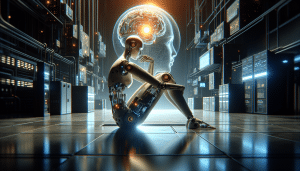You Won’t Believe How Quantum Computing Changes Tech
Aiden Foster October 23, 2025
Explore why quantum computing is sparking such intense curiosity among technology enthusiasts and scientists. This guide uncovers how it challenges traditional computing, reveals surprising applications, and examines why experts see it transforming tech and data security in unexpected ways.
What Makes Quantum Computing So Different?
Quantum computing fascinates many, blending physics and advanced computing into one concept. Unlike regular computers, which rely on binary bits—simple 0s and 1s—quantum computers use quantum bits, or qubits. These qubits exist in multiple states simultaneously, thanks to a property called superposition. The result? A quantum computer can process vast amounts of information at once, increasing its potential to solve complex problems previously out of reach, especially those tied to cryptography and artificial intelligence (https://www.ibm.com/topics/quantum-computing).
Conventional computers conduct calculations in a step-by-step manner. Quantum computing disrupts this model through entanglement—a phenomenon where two or more qubits become linked. This relationship means a change in one directly affects the other, even if they are physically apart. It’s this unique connectivity that boosts computational speed and power, opening up entirely new pathways for research and innovation that standard technology has not made possible.
Another appealing feature is quantum tunneling. This permits quantum computers to bypass certain obstacles that slow down traditional devices. Quantum tunneling has the potential to increase optimization in fields as diverse as logistics, material science, and chemistry. The implications reach far beyond computing alone: imagine new medicines, discoveries in particle physics, or even advances in weather prediction—all rooted in the extraordinary mechanics of the quantum world (https://www.nist.gov/programs-projects/quantum-computing).
The Real-World Applications of Quantum Technology
Many wonder how quantum computing will impact everyday life and modern industries. One exciting area lies in advanced simulations for pharmaceuticals. Current drug discovery methods require extensive time to test molecules and predict their behavior. In contrast, quantum algorithms can evaluate countless molecular combinations simultaneously, helping researchers find new treatments with more speed and accuracy than before (https://www.nature.com/articles/d41586-020-02107-6).
In finance, experts are eager to see quantum computers optimize investment portfolios and enhance risk analysis. By quickly evaluating market fluctuations and simulating economic outcomes, quantum technology can uncover new patterns and support smarter decision-making. Its ability to process complicated algorithms makes it especially attractive to industries that handle vast quantities of data and high-stakes forecasting, such as financial institutions and insurance firms.
Another anticipated use is in logistics and operations. Route optimization—finding the most efficient delivery routes or scheduling manufacturing processes—has been a persistent challenge. Quantum solutions can sift through options exponentially faster, reducing costs and energy use for shipping providers and manufacturers worldwide. These real-world advances demonstrate quantum computing’s potential to influence daily routines and reshape fundamental business models in significant ways.
Why Data Security and Encryption Are Being Rethought
Quantum computing is often viewed as a double-edged sword for cybersecurity. On the one hand, its advanced processing could support breakthrough methods in data encryption and privacy. On the other, quantum technology could also overpower current encryption standards. Many widely used cryptographic algorithms—like RSA—are vulnerable if faced with a sufficiently powerful quantum computer. This brings both opportunity and urgency to discussions about next-generation security protocols (https://www.nsa.gov/News-Features/Feature-Stories/Article-View/Article/2722586/quantum-computing-and-the-impact-on-encryption/).
As quantum-resistant encryption methods are being developed, organizations are reexamining how they manage sensitive data. Governments and private sectors engage in proactive research, exploring new cryptographic techniques that may withstand quantum attacks. These efforts include the development of lattice-based, hash-based, and multivariate polynomial encryption schemes, which are less susceptible to the speedy calculations that quantum devices can perform.
Quantum key distribution is another field gaining traction. This method leverages quantum mechanics to ensure that any interception attempt disrupts the information, making eavesdropping easier to detect. These promising approaches highlight why quantum computing has become a central focus for those working on the future of digital security and the protection of global infrastructure.
Quantum Computing’s Role in Artificial Intelligence
The intersection of quantum computing and artificial intelligence (AI) is especially intriguing. Standard AI algorithms often rely on a vast array of data and computing power. Quantum computing can accelerate machine learning by processing data in ways that aren’t possible on classical machines. This could lead to faster solutions for complex problems, from image recognition to language processing (https://www.ibm.com/research/quantum-computing/ai).
Some organizations are already experimenting with quantum-enhanced neural networks. These platforms are believed to improve pattern recognition, recommendation engines, and problem-solving strategies. With qubits handling intricate computational tasks, there is growing excitement over the possibility of detecting subtle data anomalies, creating better user experiences, and supporting breakthroughs in areas like autonomous vehicles and personalized medicine.
This blend of quantum computing and AI could revolutionize sectors like healthcare, logistics, and climate science. It’s not just about speed. Quantum-driven models may be able to uncover patterns and relationships that classical machines simply overlook. In the years ahead, quantum advances could play a critical role in powering the next era of machine intelligence and automation.
The Challenges in Making Quantum a Reality
Despite all the promise, quantum computing faces many hurdles. One key obstacle is the need for extremely low temperatures to maintain qubit stability. These delicate conditions require specialized hardware and significant investment, making commercial quantum systems rare and costly to develop. Major tech firms, research centers, and governments are racing to overcome these technical limitations (https://www.nature.com/articles/s41578-020-00242-4).
Error correction is another major challenge. Qubits are susceptible to interference from heat, electromagnetic fields, and other environmental factors, leading to what’s known as quantum decoherence. Scientists are working on quantum error-correcting codes and improved system designs to maintain computational accuracy and reliability. These advances are crucial for creating stable, functional machines that can handle real-world tasks.
Accessibility and skill gaps also play a role. Quantum programming languages, such as Qiskit and Cirq, are quite different from traditional coding platforms. This means developers must acquire new expertise to build and troubleshoot quantum applications. Educational initiatives, including university courses and online training modules, are helping to bridge this gap so that a wider audience can contribute to the emerging quantum ecosystem.
Preparing for a Quantum-Driven Future
It helps to consider how organizations and individuals can adapt to quantum advances. For businesses, keeping up with the latest research and investing in quantum-safe technology offers a path to resilience. This could involve developing hybrid systems that use both classical and quantum methods to optimize performance and safeguard operations as the landscape evolves (https://www.coursera.org/articles/quantum-computing).
The educational sector is also responding. Universities are launching new courses and degree programs dedicated to quantum information science. These efforts support a new generation of researchers, engineers, and entrepreneurs. Accessible online programs, workshops, and hands-on labs are making it possible for people of all backgrounds to cultivate quantum literacy and technical skills, helping to fuel the field’s momentum.
Finally, it is important for the public to engage in conversations about policy, ethics, and societal impact. Quantum technology has the potential to reshape industries, economies, and even privacy expectations. Understanding these implications, and ensuring a broad, inclusive discussion, will help guide its development so that the benefits are widely shared and responsibly managed.
References
1. IBM. (n.d.). Quantum computing. Retrieved from https://www.ibm.com/topics/quantum-computing
2. National Institute of Standards and Technology. (n.d.). Quantum Computing. Retrieved from https://www.nist.gov/programs-projects/quantum-computing
3. Castelvecchi, D. (2020). Quantum computers ready to leap out of the lab in 2020. Nature, 577(7788), 19-20. Retrieved from https://www.nature.com/articles/d41586-020-02107-6
4. National Security Agency. (n.d.). Quantum Computing and the Impact on Encryption. Retrieved from https://www.nsa.gov/News-Features/Feature-Stories/Article-View/Article/2722586/quantum-computing-and-the-impact-on-encryption/
5. IBM Research. (n.d.). Quantum Computing in AI. Retrieved from https://www.ibm.com/research/quantum-computing/ai
6. Coursera. (n.d.). What is Quantum Computing? Retrieved from https://www.coursera.org/articles/quantum-computing








